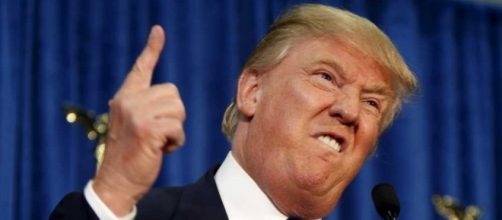When President Trump was in Saudi Arabia, many were confused as to what such a menacing figure was doing in one of the most conflicted parts of the world. The horrific reality then began to present itself when it was learned that he would give a speech about extremism. There was an International consensus that he would inflame sectarianism in the region as he has aggressively demonized Muslims during his campaign and as president, even accompanied his rhetoric with action by enforcing a travel ban against Muslims and certain Muslim nations. Needless to say, the stakes were quite high.
But everyone was eventually set at ease because he didn't use the phrase, "radical Islamic terrorism," which many felt would only stir up more controversy.
President Trump avoided 'radical Islamic terrorism' in speech
Initially, it was believed that his speech on Islamic terrorism would be a major risk as he would make it near Islam's holiest of sites, Mecca. The speech was reportedly written by Islamaphobe senior policy advisor Stephen Miller who has drawn his own share of controversies. But it was also reported that Trump had made final edits to the speech himself. Another reason the speech was already expected to stoke regional tensions was that, at the time, much of the world's focus was on both Saudi Arabia and neighboring Iran where Hassan Rouhani had just won re-election as President.
Again, the phrase "radical Islamic terrorism," was a major concern even though Republicans in the party that President Trump leads have in the past attempted to mainstream the phrase into the public vocabulary since the Obama-era.
It's been reported that in the past, national security advisor H.R. McMaster had suggested very strongly to the President that he not use the phrase during his first address to Congress on February 28. It's also been said that when the President has been advised to not say or even do something that might look bad, he generally defies that advice and does it anyway. Basically, it's safe to assume that telling Donald Trump to not do something translates to mean the opposite and as we know from his address to Congress, he used the phrase "radical Islamic terrorism" several times.
That certainly didn't help lower the anxiety before his speech in Saudi Arabia.
Trump presence builds anxiety
The director of the Center for Gulf Affairs at the Middle East Institute, Gerald Feierstein, agreed that there was a great possibility that President Trump was going to go off script. Blasting News reported on the relationship between Gen. H.R. McMaster and Trump where it provided reasons as to why the President would not listen to his advice. But prior to Trump's speech on May 21, MacMaster promised reporters that the speech would be direct but inspiring. He said that it was intended to unite the Muslim world with the United States against a common enemy. The Hill broke down the events leading up to the speech in which Feierstein said that even though President Trump might be helped out by the teleprompter, to not bet on the President confining himself to it.
NEW: Trump readies high-stakes speech to the Muslim world https://t.co/1zMLYF4aOA pic.twitter.com/1xc5ms7lP4
— The Hill (@thehill) May 21, 2017
In the end, the speech was -- as McMaster promised - direct, where Trump demanded that the governments in that region force extremists out of their cities, their religion and essentially, off of this world. There was a sense that the President's words were simply rhetoric and that most of the positive reception came from the Saudis, although, there is no indication that the speech made much of an impact elsewhere. It's been noted that in his other travels that followed to Israel, Rome and Brussels that the Trump administration continued to refer to Saudi Arabia as the best part of their trip and their success.
Trump's world trip confirmed expectations
For Americans, the fact that he wasn't abroad was somewhat a relief. As more reports came in over White House controversies, there were some comedically awkward moments to watch from afar with President Trump's tense handshake with France's new president Emmanuel Macron. There was also footage of Trump shoving the prime minister of Montenegro out of his way for a photo op. But while all of that was happening, the scandals at the White House were getting worse and everyone could see that the administration would be facing a new phase in an investigation into their possible ties with Russian officials over their interference into the 2016 Presidential Election.
That new phase being that it would now take the form of a criminal investigation.
The investigation asserts that Russian hackers stole a trove of emails from the Democratic National Committee last year before their convention. Since then, there have been endless signs of the Trump campaign's involvement, with aides who have a past of working with or for Russian officials and -- before he left the country -- mounting evidence of obstruction of justice by the President himself. As mentioned, President Trump also paid a lukewarm visit to Israel, followed by visiting NATO then the Pope at the Vatican -- who he verbally attacked during his campaign last year-- before ending his trip with a visit to Brussels.
President Trump has already shown that he can be unfriendly to world leaders in public such as he was with German Chancellor Angela Merkel at the White House earlier this year when he refused to shake her hand. Since his return to America, Merkel spoke on behalf of Europe to say the could no longer count on the United States under President Trump and that they would "go it alone". Rather than the expectation that Trump would inflame tensions in the Middle East, he seemed to have done a better job upsetting Europe instead, which likely means that President Trump accomplished what he set out to do.


